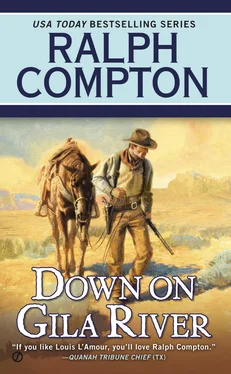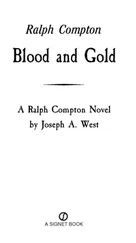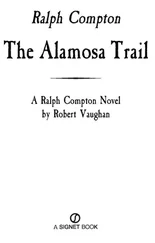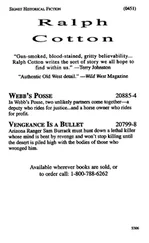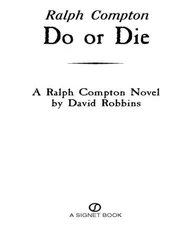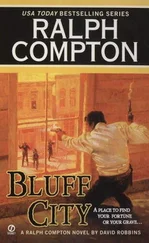Dang, that was going to hurt later. If there was a later.
His knee paining him, Sam’s anger again flared.
He jumped up and fanned his Colt dry. Then he holed up behind the boulder again.
A derisive laugh rose from the flat in front of him, his wild shots tickling some Apache’s sense of humor.
Sam took shells from his cartridge belt and fumbled six into the chambers of his revolver.
His canteen hung from his saddle horn, wherever that was now, and thirst had begun its slow torment. His mouth was as dry as mummy dust, and his red-rimmed eyes felt gritty in the sun glare.
He rubbed his aching knee, angry that the Apaches were not giving up, angry with himself for leaving the security of the Rafter-T, and hazarding what was left of his future on a wild adventure to Silver City.
He was too old for wild adventures, and the Mescaleros were busy making that obvious.
But fate can be as flighty as a sixteen-year-old girl at her first cotillion.
And now it intervened on Sam Sawyer’s behalf.
Bronco Apache warriors, especially Chiricahua, were the most notional people on this green earth. And they proved that now.
When Sam looked over the boulder rim, all three Apaches had mounted their ponies in full view of him—a comment on what they thought of his marksmanship—and one of them, wearing the yellow headband of a former army scout, led his saddled mustang.
Sam didn’t need to think about it—the fact was obvious that they were giving up the fight and moving on.
He was mightily puzzled over the why of the thing.
But, rack his brain as he might, he came up with no answer. Though he thought up a few maybes.
Maybe they figured the mustang, saddle, and rifle were booty enough and it was not worth getting killed or wounded just to murder a gray-haired white man. Maybe they were homesick for their ranchería and their wives and young’uns. Maybe they’d gotten a sudden attack of the croup.
Maybe a lot of things.
But they were leaving and that was enough to bring a smile to Sam Sawyer’s craggy, weather-beaten face.
So puffed up was he in this reversal to his fortune that he stepped clear of the boulder and yelled, “Hey, you! Leave that dang mustang hoss right where it’s at.”
The Apache in the yellow headband drew rein and stared at Sam for a long time, his black eyes glittering. Then he bent over on his pony’s back and slapped his rear with the flats of his hands.
Now Sam knew he’d been insulted, both as a man and a warrior, but he did nothing. He wasn’t a good enough shot to hit the Mescalero’s backside, and a miss would only make the Apaches mad and stir things up again.
So he just stood and watched the Apaches leave. He could still hear them laughing at him long after he could no longer see them.
* * *
Thus it was that Sam Sawyer, in low spirits, came down from the breaks and onto the flat. He had no horse, no water, and no food—and it was a long, long way to Silver City.
Sam walked for an hour and amused himself by kicking a rock, keeping it in front of him, retrieving it from under cactus or brush, then toeing it forward again. His shadow grew longer and his feet had started to ache when he stumbled on a narrow stream that branched off from Sacaton Creek.
The water was warm and brackish, but Sam drank deep, then fetched his back against a cottonwood, built a cigarette, and considered his situation. In truth, he had little to consider. By his recollection, Silver City lay about forty miles to the south, tucked into a rocky cradle of rugged mountains, ravines, and mesas. Even for a walking man it was a fur piece, and, like every cowboy ever born, Sam Sawyer was not a walking man.
His store-bought boots had cost him four dollars and seventy-five cents three years before and were much scuffed and down-at-heel, and easy enough on the feet. But they’d been made tight and narrow on a horseman’s last, and hiking in them had never entered the boot maker’s thinking.
Now, as Sam’s feet swelled, the boots pinched, scraped, and crushed his toes into tangled knots and he couldn’t pull them off because he feared he wouldn’t get them back on again.
Thus, as he smoked his cigarette and pondered his plight, Sam Sawyer was not in the best frame of mind. He carried a horse chestnut in one pocket to ward off the rheumatisms and in the other a dried rattlesnake heart for consumption. But they brought him little comfort.
He again cussed himself for leaving the Rafter-T. Like many a puncher before him with arthritic knees and a spine jarred too often by half-broke ponies, he’d been offered, and accepted, the job of assistant cook.
Looking back—dang, was it just three weeks ago?—Sam decided that a man should never turn his back on a job that offered plenty of grub, a comfortable bunk, and free whiskey every Friday night, plus a handsome salary of thirty a month.
He glanced at the sky where the sun was beginning its drift to the west and he took on a philosophical turn of mind. What was it his ma always said? Oh yeah, she’d say, “Samuel, it’s no use crying over spilt milk.” Well, Ma was right. He’d chosen his way and now he’d have to stick to it without regret.
He’d made up his mind, but Sam figured that up until now Ma’s advice sure hadn’t helped much.
Chapter 2
Hannah Stewart walked back to her cabin, a basket of brown eggs hanging from one arm, but stopped a few feet short of the door as a distant movement across the brush flats caught her attention.
The flats shimmered in the late summer sun, and dust drew a fine veil over the distance. She laid the basket at her feet and shaded her eyes against the glare. Her gaze reached far and finally rested on the moving speck that grew in size as it slowly came nearer.
Beyond the flat rose the purple peaks of the Mogollon Mountains that stretched westward to the Arizona border, a ragged rampart against the blue haze of the sky.
Hannah glanced away, rested her eyes, and once again returned her gaze to the approaching . . . figure.
Yes, it was a man, no doubt about that. An Apache?
The woman dismissed the thought. The man didn’t move like an Indian. Rather, he had a hesitant, high-stepping gait, like somebody walking barefoot on nettles.
Hannah felt a tug on her skirt.
“Is it Pa?” her daughter asked, her brown eyes wide and as round as copper coins.
A pang of something akin to sadness stabbed at Hannah Stewart’s heart. “No, Lori,” she said, “it’s not Pa.” She took the child’s hand. “We’re going inside,” she said.
“Let me carry the eggs,” Lori said.
“I think they’re too heavy for you, honey.”
“No, they’re not. I’m a big girl now. I’m four.”
“Three.”
“Nearly four.”
Hannah smiled. “All right, carry the basket, but be careful.”
She opened the door wide for the child, and then glanced back at the man on the trail.
A white man. Big hat, knee-high boots, a gun on his hip.
A cowboy, then. Or an outlaw.
Hannah helped Lori put the eggs on the table. Then she took the shotgun from above the fireplace. She crossed the floor to a cupboard, opened the drawer, and took two bright red shells from a box.
She loaded the Greener and turned to Lori. “Shh,” she said, forefinger to her lips. “Be a little mouse until I come back.”
The girl looked at her mother in alarm and Hannah smiled.
“It’s only a cowboy searching for his lost horse,” she said. “I’ll go talk to him, is all.”
“Be careful, Mommy,” Lori said, her voice trembling a little.
“I will,” Hannah said. “Now, remember, be a quiet little mouse.”
She stepped outside—just as Sam Sawyer reached the well. Hannah saw the man’s eyes move over her, from her face to her breasts to the swell of her hips under her plain gray work dress.
Читать дальше
